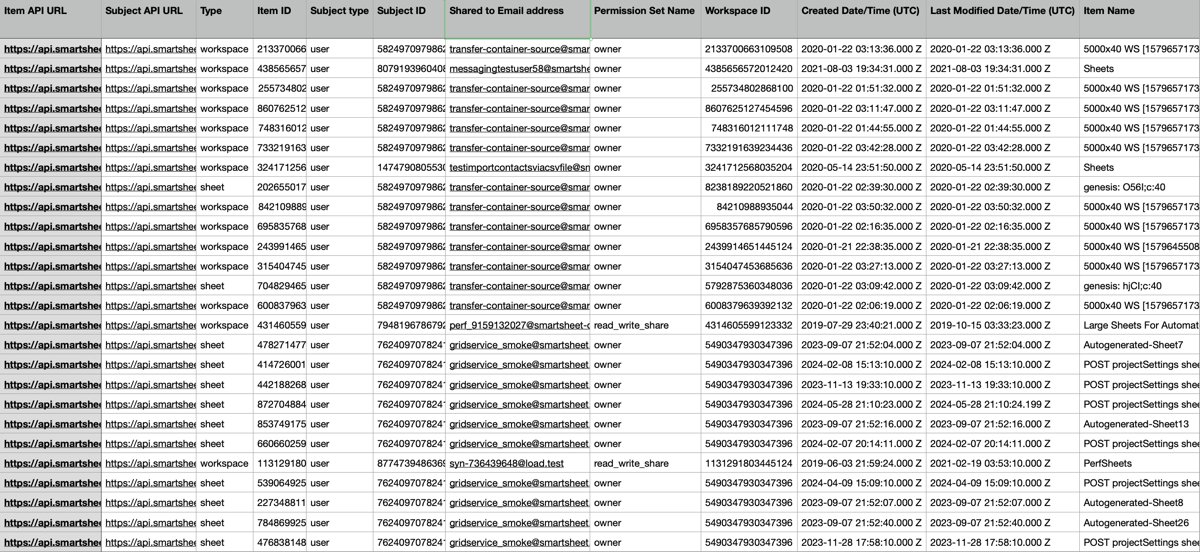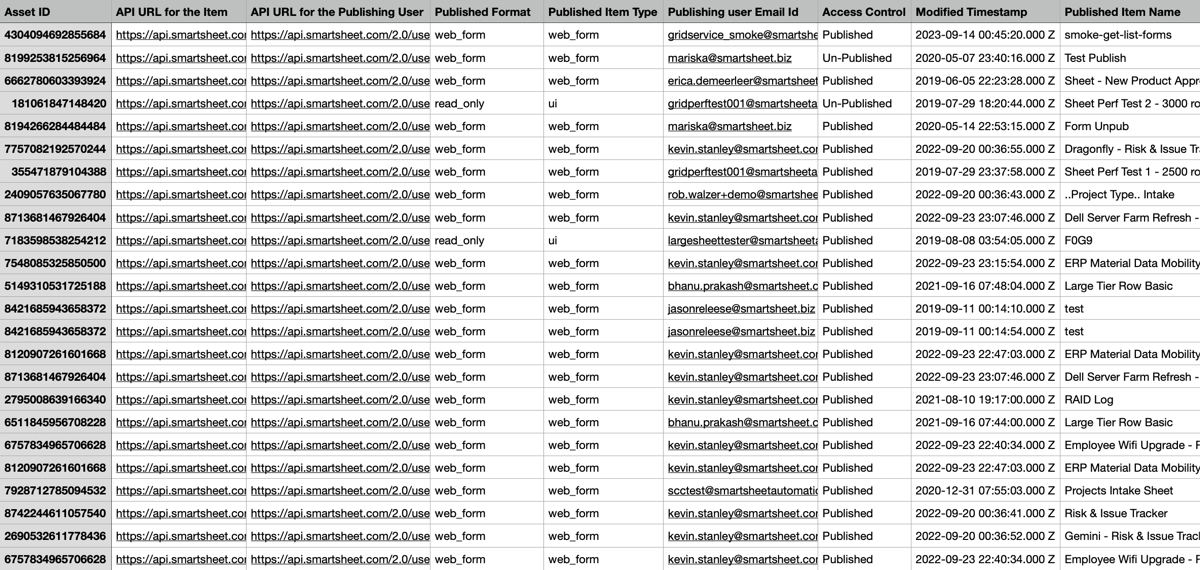Sheet access reports are helpful when performing routine audits on who can access your items and on what level. These reports provide the date and time each user last accessed an item. Published items reports help you see which items were published and by whom.
Overview
There are two versions of the Sheet Access and Published Items reports. The version you receive depends on the amount of items in your plan.
- The alternate version, which includes additional API endpoints, will be available for larger reports. This provides raw, non-expanded data and utilizes item URLs for detailed information retrieval.
- Smaller reports will receive the standard version.
Both versions of the report contain varying information to enhance the speed and performance of report generation.
Generate a sheet access report
- Sign in to Admin Center.
- Select the Menu icon to expand the left sidebar, then select User Management (Legacy Collaborator Model) or User Roles and Reports (User Subscription Model).
- Select More Actions > Sheet Access.
Check your email. The report goes to the email associated with your Admin Center login.
If your report doesn't generate or the system times out, contact Support. They will assist you by enabling the alternate version of the sheet access report, which is designed for reports that failed to generate due to their size.
Standard version
The standard version of the sheet access report includes the following data:
- Key: The unique key for each sheet in your team's Smartsheet account. Users don't see this key. It can be helpful when you have multiple sheets with the same name.
- Name: Sheet names seen in your Smartsheet session.
- Workspace Name: Workspace names in your Smartsheet session.
- Owner: This field is intentionally left blank. Plans, not individual users, own Smartsheet items. Learn more about our asset ownership model.
- Shared To: All email addresses for those who have sheets shared to them, whether licensed, unlicensed, or external collaborators.
- Shared To Permission: Gives what permission of who it was shared to (Owner, Admin, Editor (can share), Editor - (cannot share), Viewer, Commenter.
- Last Modified Date/Time (UTC): Last date/time when the sheet was updated.
Alternate version
To support large-scale deployments of these reports, Smartsheet introduced item and subject API URLs rather than linking to the item or expanding all the details of the user/group. Direct links and expanded details can create performance issues; using API URLs allows for the efficient creation and consumption of the report.
The alternate version of the sheet access report contains the following columns:
- Item API URL
- Subject API URL (API URL to user/group)
- Type (item type, such as sheet or workspace)
- Item ID
- Subject type (user/group)
- Subject ID (user or group ID)
- Shared to Email address
- Permission Set Name (for example, read_only)
- Workspace ID
- Created Date/Time (UTC)
- Last Modified Date/Time (UTC)
- Item Name

Download a sample sheet access report
Follow this link to download a sample sheet access report:
Generate a published items report
- Sign in to Admin Center.
- Select the Menu icon to expand the left sidebar, then select User Management (Legacy Collaborator Model) or User Roles and Reports (User Subscription Model).
- Select More Actions > Published Items.
Check your email. The report goes to the email associated with your Admin Center login.
If your report doesn't generate or the system times out, contact Support. They will assist you by enabling the alternate version of the published items report, which is designed for reports that failed to generate due to their size.
Standard version
The standard version of the published items report contains the following columns:
- Id
- Name
- Type
- Owner
- Publisher
- Publish Type
- Access Control
- Publish Link
- Last Modified Date/Time (UTC)
Alternate version
The alternate version of the published items report contains the following columns:
- Asset ID
- API URL for the Item (for Item Name)
- API URL for the Publishing User
- Published Format
- Published Item Type
- Publishing user Email Id
- Access Control
- Modified Timestamp
- Published Item Name

Download a sample published items report
Follow this link to download a sample published items report:
What's the difference between the standard and alternate versions of the Sheet Access report?
The main difference is the introduction of additional API endpoints, providing raw, non-expanded data, and the use of Item URLs for detailed information retrieval.
Are the alternate report formats applicable to both org-level and specific user-level report generation?
Yes, the updates apply to both types of report generation.
Is there an option to export the report in JSON format?
No.
What is the syntax for the Item API URL and Subject API URL?
The syntax for the Item API URLs is as follows:
- For a sheet: https://api.smartsheet.com/2.0/sheets/{{Resource ID}}
- For a report: https://api.smartsheet.com/2.0/reports/{{Resource ID}}
- For a dashboard: https://api.smartsheet.com/2.0/dashboards/{{Resource ID}}
The syntax for the Subject API URLs is: https://api.smartsheet.com/2.0/users/{{Subject ID}} or https://api.smartsheet.com/2.0/groups/{{Subject ID}} based on if the Subject Type is user or group.
How can I locate the Item IDs and Subject IDs?
To find the {{Resource ID}} for sheets, reports, or dashboards before the Sheet Access report is updated, you can navigate within Smartsheet to the specific asset, select File > Properties, and locate the asset ID listed there. The new Sheet Access report also contains a Resource ID column.
As for User IDs, these aren't readily displayed in the Smartsheet UI since email addresses serve as the primary identifier. To obtain User IDs, you need to utilize the Get User API. Here’s a quick guide on how you might retrieve User IDs:
- Make an API call to the Users endpoint: https://api.smartsheet.com/2.0/users
- Parse the response to extract User IDs associated with the current user’s email address.
For more information, review the Smartsheet Developer Portal.

